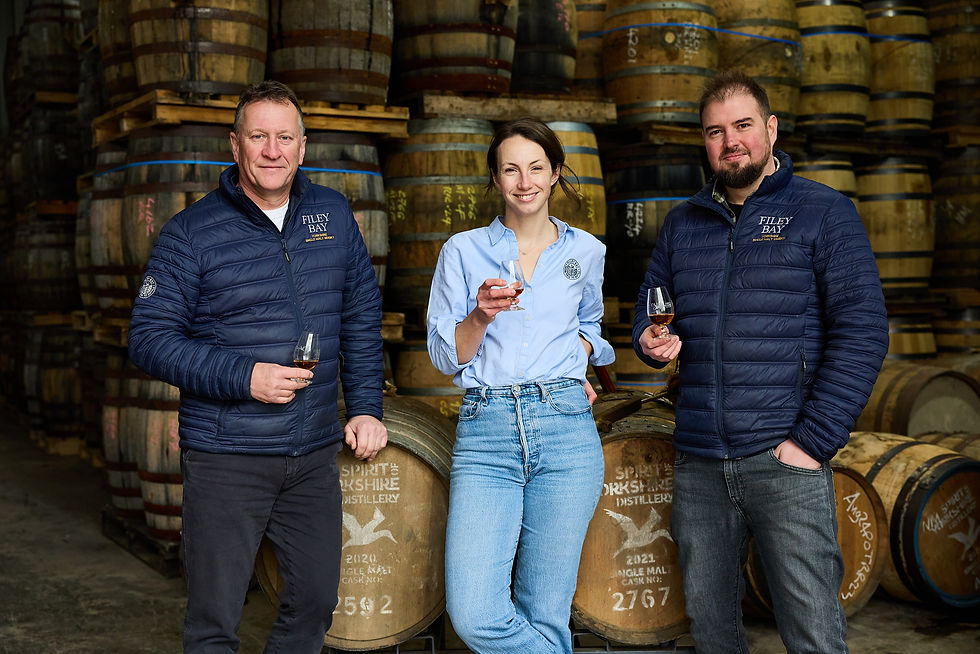EWG Distillery Focus: The English Distillery
- Dec 19, 2023
- 3 min read
Next up in our Distillery Focus series, outgoing EWG Chairman Andrew Nelstrop talks us through the life and times of The English Distillery.

What does English whisky mean to you?
English Whisky is obviously incredibly special to the Nelstrop family. When my father decided to build England’s first registered whisky distillery some twenty years ago, he couldn’t possible have imagined the industry he would kickstart. When he passed away in 2014 it was a legacy he was incredibly product of.
For me the meaning has changed over time. Not so long ago, English Whisky meant my own stock and very little else, which was a mixed blessing. However, over the last few years we have been joined by several other distilleries both big and small, so the combined marketing effort for the sector has increased exponentially.
English whisky has to continue to build its reputation as a serious whisky category, made with passion and care resulting in a whisky that is equal to any worldwide. The industry should, and I believe will, with the GI, fight to ensure that quality remains the leading premise behind all English Whiskies.
What makes your whisky (and distillery) unique within the English whisky sphere?
One of the hardest questions to answer without quoting lines from the marketing bible that every distillery has! Each & every distillery makes a spirit unique to them and that spirit is matured according to rules / desires set by each distillery, resulting in a distinct house style.
As the pioneers of English Whisky, we have made the decision to mature all our stock in our own bonded warehouses here in Norfolk. In production we use water from an aquifer beneath the distillery and our barley is grown in East Anglia with much of it from on our own family farms. By controlling the ingredients and casks we have the ability to perfect every drop before it is bottled (again - on site by our own team). Our whisky distillery has had 18 years to perfect that house style and our expertise is dedicated to the art of making world-class whisky.
What is the achievement that you are most proud of?
There are a lot of milestones we have passed that make us terribly proud: Being the first registered whisky distillery in England for over 100 years was an extraordinary moment for us and one that meant my father had fulfilled his lifelong ambition. Having the distillery opened by King Charles (Prince back then) and the continuing close relationship. Launching the first single malt whisky in England (a big relief when it sold out in a few hours). I am incredibly proud of our team, that do a terrific job of making wonderful whisky, looking after the distillery visitors and selling our whisky to 30+ countries around the world.
After all these milestone events there is still one thing that fills me with the most pride: Walking into an unknown shop or hotel and unexpectedly finding our products available.
I also have to mention that I will always be incredibly proud that I was chosen to be the founding chairman of the English Whisky Guild (EWG). As my time in the seat has come to an end, I can look back and over the last few years and be very pleased with where the EWG is now – it is a prime example of what the industry can achieve when working together. I fully expect the Guild to grow and flourish in the coming years.
What do you think will be the biggest challenge for English whisky in 2023?
There are several coming I believe, specifically within the supply chain.
The availability of Bourbon casks which have been the industry staple for a long time and have helped created the house styles of whisky we drink today, is a potential challenge.
We all know too well, the huge increases in costs ( energy, cereals, packaging, casks, duty) experienced in the last 3 years. There is a limit on the price that can be charged for our products, so invariably we will swallow some of this cost increase ourselves, but this can only be done so many times whilst remaining profitable. It is a challenge balancing the cost base with prices you can charge for your product.
Longer term – how do you assess the future for English whisky?
I assess it with optimism and glee – otherwise why are we doing what we do? One of the most striking differences between the various distilling companies appears to be their long-term objective. Some are brand-building, some are looking for an exit plan and some will be generational. Our initial plan, that is still core to our decision making, is the belief that the distillery will still be here, and family owned, in a 100 years’ time. We have cask laying schedules that stretch forward to 2073! This long-termism changes how short- and medium-term problems are viewed and stops them dominating the long-term discussions.



